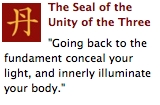Masters and Texts of Taoist Alchemy
Internal Alchemy (Neidan)
 The Seal of the Unity of the Three (Cantong qi)
The Seal of the Unity of the Three (Cantong qi)
Under an allusive poetical language and thick layers of images and symbols, the Cantong qi (Seal of the Unity of the Three) hides the exposition of the teaching that gave origin to Taoist Internal Alchemy (Neidan).
 Book of the Hidden Agreeement (Yinfu jing)
Book of the Hidden Agreeement (Yinfu jing)
Despite its brevity, the Yinfu jing, or Book of the Hidden Agreement, is one of the most obscure and difficult Taoist texts. The selections translated here are accompanied by the commentary by Yu Yan (1258–1314), a learned and prolific author who wrote both independent works and commentaries to earlier texts.
 Mirror for Compounding the Medicine (Ruyao jing)
Mirror for Compounding the Medicine (Ruyao jing)
Originally written in the 10th century, the Ruyao jing (Mirror for Compounding the Medicine) describes the foundations of Internal Alchemy in 20 short poems of four verses.
 Awakening to Reality (Wuzhen pian)
Awakening to Reality (Wuzhen pian)
The Wuzhen pian (Awakening to Reality) is one of the most important and best-known Taoist alchemical texts. Written in the 11th century, it describes in a poetical form, and in a typically cryptic and allusive language, several facets of Neidan (Internal Alchemy).
 400 Words on the Golden Elixir (Jindan sibai zi)
400 Words on the Golden Elixir (Jindan sibai zi)
The Jindan sibai zi (400 Hundred Words on the Golden Elixir) is attributed to Zhang Boduan (the author of the Wuzhen pian). The text is made of twenty poems, each containing four verses of five characters. The commentary translated here is by Peng Haogu (fl. 1586–99).
 Wang Chongyang (1113–70)
Wang Chongyang (1113–70)
Wang Chongyang was the founder of the Northern Lineage (Beizong) of Neidan. Also known as Wang Zhe, he apparently led a rather turbulent life until 1159, when he is said to have met Zhongli Quan and Lü Dongbin and to have become an ascetic.
 Bai Yuchan (1194–1229?)
Bai Yuchan (1194–1229?)
Bai Yuchan is one of the main figures in the history of Neidan. Despite his apparently brief earthly existence, he is ascribed with a remarkably vast literary production. The selections translated here concerned with the different levels of Neidan. They also show that the same terms take on different senses according to the different levels (or stages) of Neidan.
 Li Daochun (late 13th century)
Li Daochun (late 13th century)
Li Daochun is one of the great masters of the Mongol Yuan dynasty (1279–1368), an extremely important period in the history of Neidan. He is the creator of one of the most remarkable attempts to merge the Northern and Southern lineages, which had independently developed in the previous two or three centuries.
 Secret of the Golden Flower (Jinhua zongzhi)
Secret of the Golden Flower (Jinhua zongzhi)
The Secret of the Golden Flower is probably the best-known work on Taoist Internal Alchemy outside China. The selections translated here derive from the version found in the Daozang xubian (Sequel to the Taoist Canon), which belongs to the Longmen (Dragon Gate) lineage.
 Liu Yiming (1734-1821)
Liu Yiming (1734-1821)
Few other masters have illustrated the relation between Taoism and Internal Alchemy as clearly as Liu Yiming does in his Cultivating the Tao (original title: Xiuzhen houbian). Grafting Internal Alchemy into the teachings of the Daode jing (Book of the Way and Its Virtue) and of the later Taoist tradition, he shows how the Way of the Golden Elixir can lead to the highest state of realization according to the Taoist principles.
 Other selections from texts of Internal Alchemy
Other selections from texts of Internal Alchemy
Short selections from Neidan texts:
● The Dragon and the Tiger (Li Daochun)
● Essence, Breath, and Spirit (Chen Zhixu)
● Alchemical Metaphors (Xiao Tianzhi)
● The Realized State (Weng Baoguang)
● The Alchemical Embryo (Wu Shouyang)
External Alchemy (Waidan)
 Rituals
Rituals
In the Taiqing (Great Clarity) tradition od External Alchemy, compounding an elixir is part of a larger process that consists of several stages, each of which is marked by the performance of rites and ceremonies. It is this process, and not merely heating the ingredients in the crucible, that constitutes the alchemical practice.
 Methods
Methods
These selections exemplify the technical features of the early Taiqing (Great Clarity) texts, which give details on the preliminary treatment of the ingredients, the preparation of the crucible, the heating process, and the collection of the elixir.
 Benefits of the Elixirs
Benefits of the Elixirs
After the methods of making the elixirs, the Taiqing (Great Clarity) texts describe the benefits that they afford. The Taiqing alchemical medicines were valued for two main reasons. First, they granted transcendence and immortality; second, they made it possible — even with no need of ingesting them — to summon benevolent gods and expel demons and other causes of various disturbances, including illness and death.











